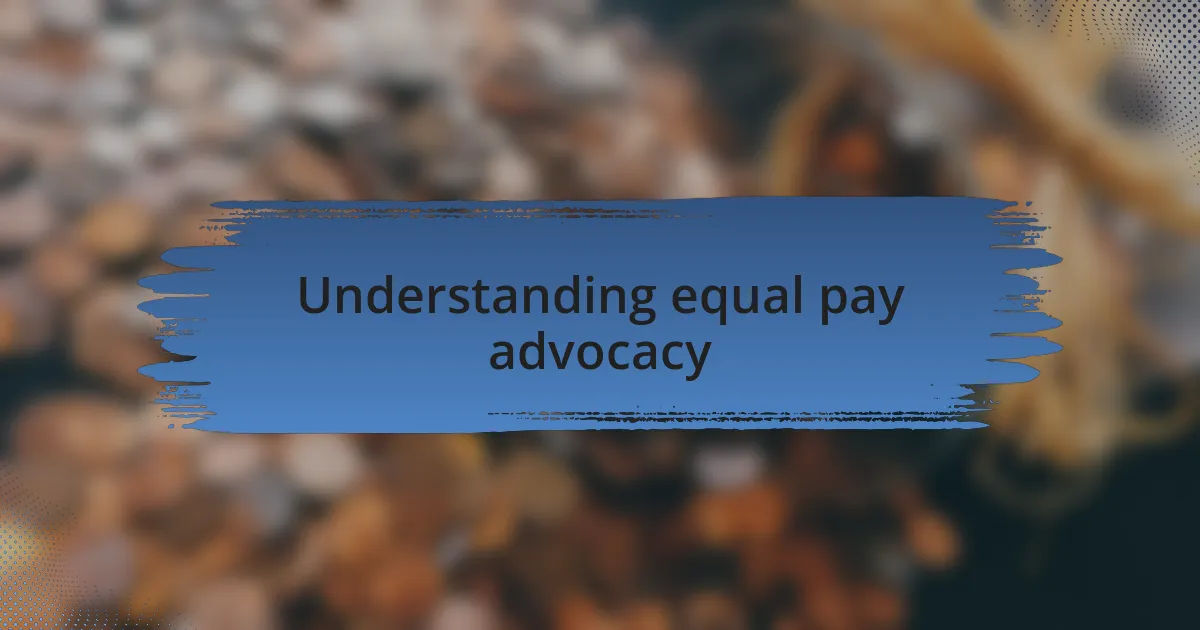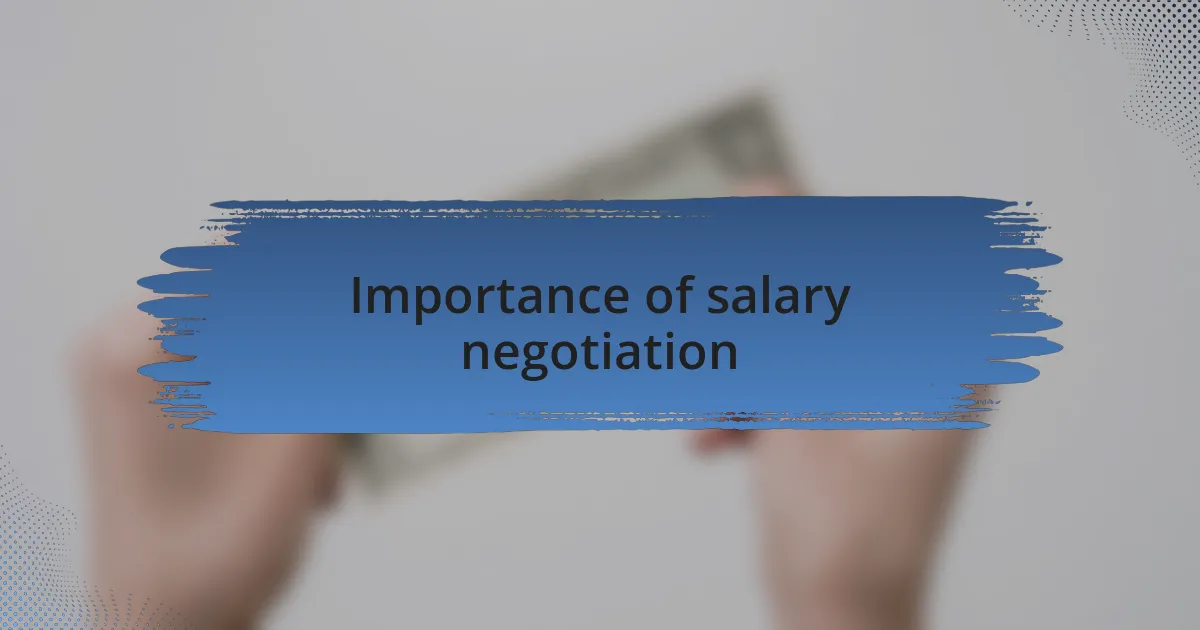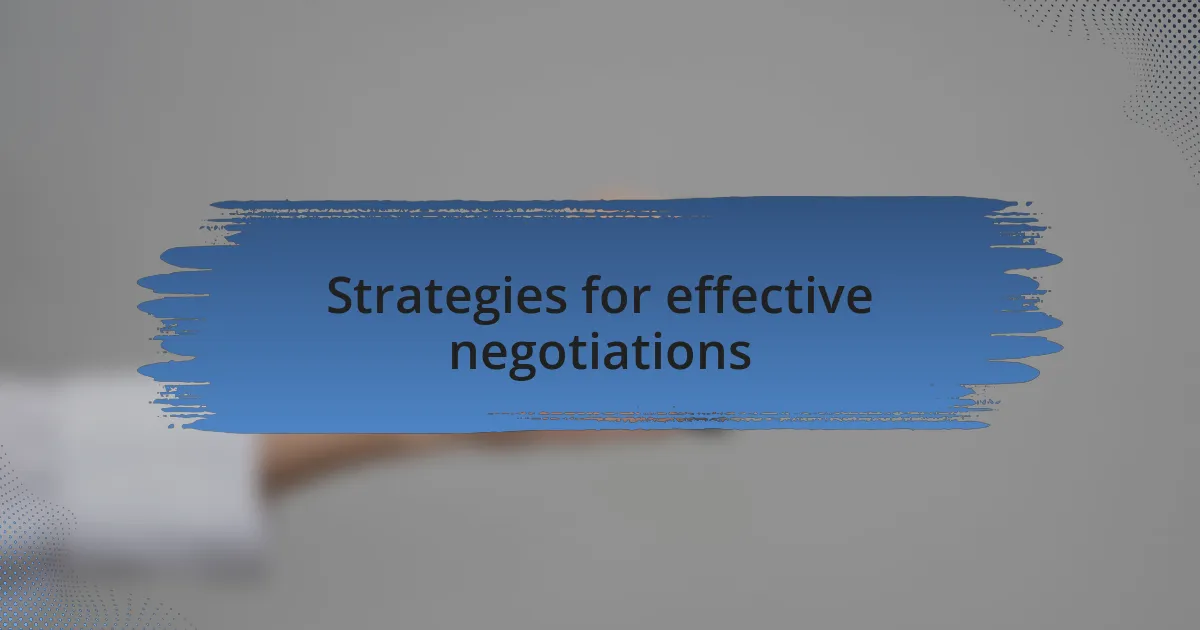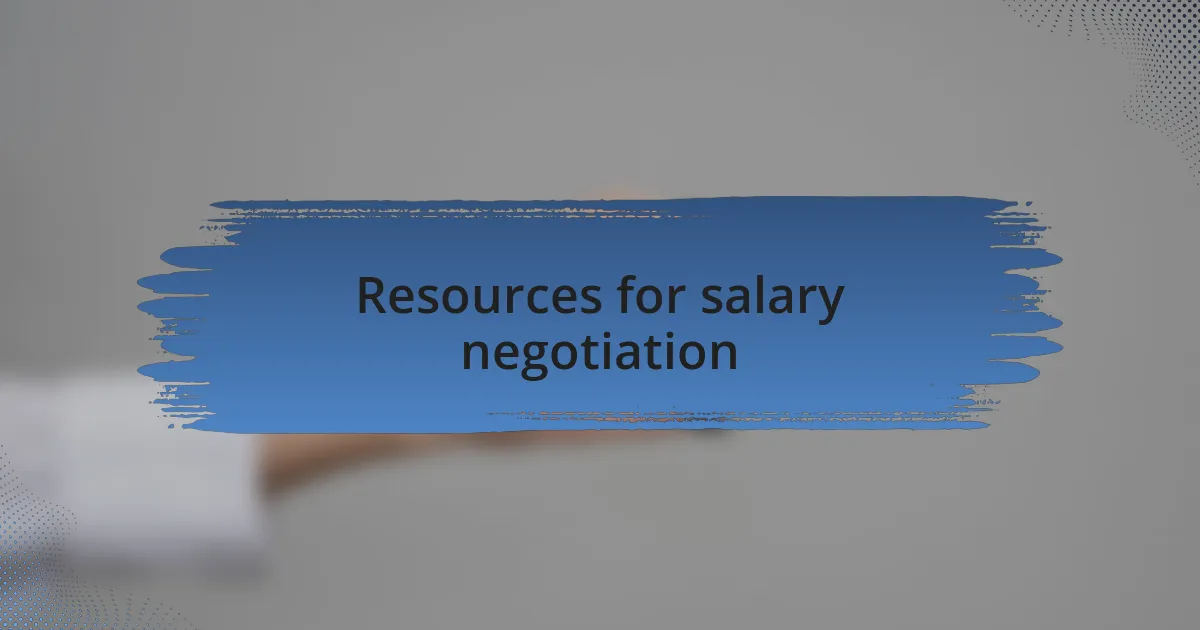Key takeaways:
- Equal pay advocacy emphasizes the importance of salary transparency and accountability to address wage disparities across gender and race.
- Negotiating salary is vital for financial well-being and reinforces self-worth, encouraging a culture of advocacy among colleagues.
- Effective negotiation strategies include thorough preparation, practicing pitches, and maintaining flexibility to reach mutually beneficial agreements.
- Common mistakes to avoid in negotiations are insufficient research, lack of practice, and letting emotions influence responses to offers.

Understanding equal pay advocacy
Equal pay advocacy centers around the principle that every individual should receive the same compensation for equivalent work, regardless of gender, race, or other distinguishing factors. I remember a time when a colleague shared her frustration over discovering she was earning significantly less than her male counterparts for the same role. It made me wonder, how many others are facing this silent inequality without even being aware of it?
This movement encourages open dialogues about salary transparency and the need for systemic change within organizations. I’ve personally seen how even small steps towards discussing salaries can empower employees. It’s empowering to confront these disparities, yet it also raises the question: how can we, as advocates, ensure this dialogue leads to tangible results?
At its core, equal pay advocacy demands accountability from employers and seeks to dismantle the ingrained biases that perpetuate wage gaps. Reflecting on my career, I’ve noticed that awareness is just the start; it takes persistent effort to challenge the status quo. How many of us are willing to stand up and push for what’s fair, not just for ourselves but for those who might feel voiceless?

Importance of salary negotiation
Negotiating your salary is crucial because it directly impacts your financial well-being and career progression. I once hesitated to ask for a raise, thinking it would disrupt my relationship with my boss. That moment taught me that advocating for myself is not just about financial gain; it’s about valuing my contributions and setting a precedent for future negotiations.
Every time I engaged in salary discussions, I felt more empowered and confident in my worth. There’s something transformative in articulating your value to an organization. It raises the stakes for not just you, but also for others in the workplace who may be apprehensive about speaking up. Have you ever debated whether your work merits more recognition? I certainly have, and I realized that negotiating isn’t selfish; it’s essential.
Furthermore, mastering salary negotiation can foster a more equitable workplace. By advocating for fair pay, you set an example for colleagues, encouraging a culture where salary discussions become the norm rather than the exception. If we don’t initiate conversations about pay disparities, how can we expect change? Reflecting on my experiences, I’ve learned that every dialogue contributes to a greater movement towards equal pay.

Strategies for effective negotiations
When it comes to effective salary negotiations, preparation is key. I always spend time researching industry standards and comparable salaries before entering discussions. This not only boosts my confidence but also provides concrete data to back up my requests. Have you ever walked into a negotiation feeling unprepared? That feeling can be daunting, but knowledge truly is power.
I’ve found that practicing my negotiation pitch with a trusted friend or mentor can make a world of difference. During one of my previous negotiations, I rehearsed with a colleague who offered valuable feedback, helping me refine my approach. The moment I stepped into the meeting room, I felt less anxious and more ready to advocate for myself. It makes me wonder—how often do we underestimate the importance of practice before big conversations?
Another strategy I advocate for is to remain open and flexible. In my experience, negotiations often require some give and take. I once asked for a higher salary but ended up negotiating for additional benefits instead. This taught me that viewing salary discussions as a collaborative process rather than a confrontation can lead to satisfaction on both sides. How can we ensure that we meet our needs while still fostering positive relationships at work? It’s all about finding that balance.

My personal negotiation experiences
Negotiating my salary has never been a straightforward process. I remember one particular instance where I was offered a position that excited me, but the initial salary was lower than I expected. It was challenging to voice my concerns, but I took a deep breath and calmly presented my research on industry salaries. That moment felt liberating, as it empowered me to assert my worth directly.
There was a time when I hesitated to discuss bonuses and benefits until the final offer stage. When I finally brought it up, I discovered it was possible to negotiate for additional vacation days. This experience reminded me how crucial it is to think beyond just the monetary aspect of negotiation. Have you ever considered how non-salary benefits might enhance your overall package? I learned that these perks can greatly contribute to job satisfaction and work-life balance.
Looking back, I realize that every negotiation is also a lesson in self-advocacy. After a challenging discussion, I vividly recall the mix of anxiety and excitement as the terms were finalized. It made me appreciate the risk involved in negotiating. Each negotiation shapes my confidence and skills, inspiring me to embrace future discussions with courage. What could your next negotiation teach you?

Common mistakes to avoid
When negotiating, one common mistake I’ve made is not doing enough research beforehand. I remember walking into a negotiation blind, feeling confident but lacking the figures to back my claims. It was a humbling moment when I realized that without understanding the market standards, I was at a disadvantage. Have you ever felt overwhelmed by the numbers?
Another pitfall is failing to practice my negotiation script. I once approached a dialogue with vague thoughts in my head, and it showed. I could see the confusion on the other person’s face, and it became clear to me that half-formed arguments just don’t cut it. Practicing helped me articulate my value clearly, turning nerves into strong, persuasive points.
Additionally, I sometimes let emotional reactions dictate my approach. One time, when I faced a lowball offer, I felt that surge of disappointment washing over me. Instead of taking a step back to assess the overall picture, I almost walked away from the conversation. I’ve learned that pausing to breathe and collect my thoughts can transform my reaction into a more thoughtful response. How do you typically handle unexpected offers?

Resources for salary negotiation
Finding the right resources for salary negotiation can make a significant difference in your approach. I recall once discovering online salary calculators while preparing for a discussion about my pay. These tools not only helped me gauge industry standards but also provided a solid foundation to build my case. Have you ever used such calculators to empower your negotiations?
In addition to calculators, I’ve often turned to salary negotiation guides that offer structured advice. A well-written resource can outline effective strategies, such as how to frame my value proposition or articulate my salary history. One particular guide I followed detailed a step-by-step process that helped me remain confident throughout the negotiation. Have you found a resource that truly resonated with you?
Networking has also played a crucial role in my preparation. Speaking with mentors and colleagues who shared their experiences opened my eyes to various negotiation tactics and pitfalls. I remember one conversation that shifted my entire perspective when a colleague casually mentioned their approach helped them secure a significantly higher salary. It made me curious about what insights might be waiting for me in my own network. What’s your go-to method for gathering insights before negotiations?